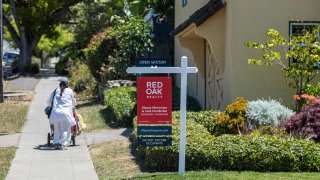
- Some homeowners are losing wealth as high mortgage rates weigh on home values, at least on paper, as the once red-hot housing market cools.
- Sales have been slowing down for several months, with mortgage rates now double what they were at the start of this year.
- Data suggests so-called tappable home equity may have peaked in May
Some homeowners are losing wealth as high mortgage rates weigh on home values, at least on paper, as the once red-hot housing market cools quickly.
Sales have been slowing down for several months, with mortgage rates now double what they were at the start of this year.
Home prices, likewise, dropped 0.77% from June to July, according to a recent report from Black Knight, a software, data and analytics company. While that may not sound like a lot, it was the largest monthly decline since January 2011 and the first monthly drop of any size in 32 months.
Get top local stories in San Diego delivered to you every morning. >Sign up for NBC San Diego's News Headlines newsletter.
"Annual home price appreciation still came in at over 14%, but in a market characterized by as much volatility and rapid change as today's, such backward-looking metrics can be misleading as they can mask more current, pressing realities," wrote Ben Graboske, president of Black Knight Data & Analytics.
Read more real estate coverage
Mortgage demand drops further as interest rates shoot back to June high
1 in 5 home sellers are now dropping their asking price as the housing market cools
Geothermal grid under Texas housing development is saving homeowners serious money
Money Report
Roughly 85% of major markets have seen prices come off peaks through July, with one-third coming down more than 1% and about 1 in 10 falling by 4% or more. As a result, after gaining trillions of dollars in home equity collectively during the first two years of the Covid pandemic, some homeowners are now losing equity.
So-called tappable equity, which Black Knight defines as the amount a homeowner can borrow against while keeping a 20% equity stake in the property, hit its 10th consecutive quarterly record high in the second quarter of this year at $11.5 trillion. But data suggests it may have peaked in May.
Declining home values in June and July brought the total amount of tappable equity down 5%, and given the weakening in the housing market since then, the third quarter of this year will show a more sizeable decline.
"Some of the nation's most equity-rich markets have seen significant pullbacks, most notably among key West Coast metros," noted Graboske.
From April through July, San Jose, California, lost 20% of its tappable equity, followed by Seattle (-18%), San Diego (-14%), San Francisco (-14%) and Los Angeles (-10%).
Homeowners are still far more flush than they were the last time the housing market went through a major correction. During the subprime mortgage crash, which began in 2007, and the subsequent Great Recession, home values plummeted by nearly half in some major markets. Millions of borrowers went underwater on their mortgages, owing more than their homes were worth.
That is not the case today. Current borrowers, on average, owe just 42% of their home's value on both first and second mortgages. It is the lowest leverage on record. Losing some value on paper shouldn't affect those owners at all.
There are, however, about 275,000 borrowers who would fall underwater if their homes were to lose 5% of their current value. More than 80% of those borrowers purchased their homes in the first six months of this year, which was the top of the market.
Even with a universal 15% decline in prices, negative equity rates would still be nowhere near the levels seen during the financial crisis, according to the report.






